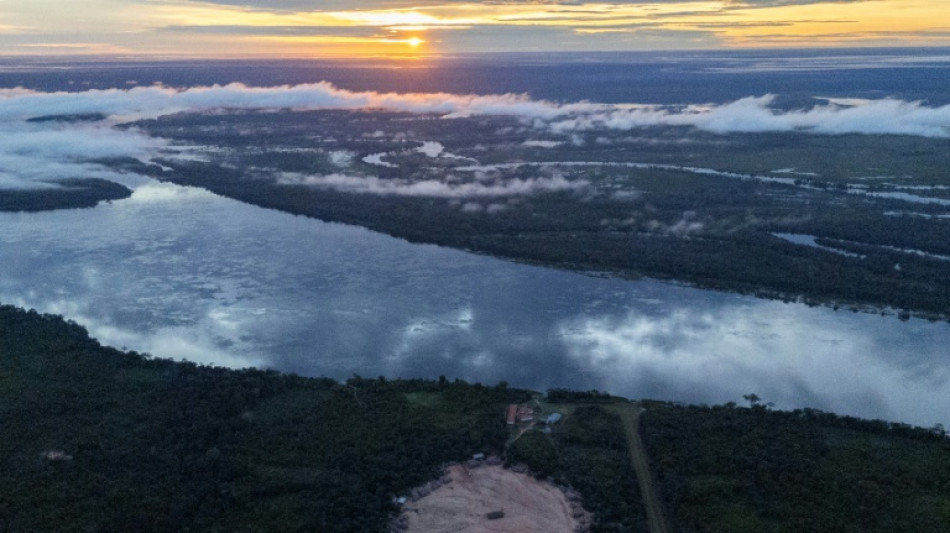
-
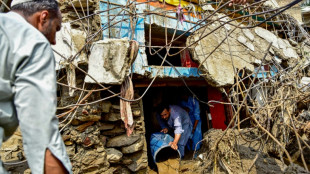 Pakistan rescuers recover bodies after monsoon rains kill 340
Pakistan rescuers recover bodies after monsoon rains kill 340
-
Hurricane Erin intensifies to category 3 storm as it nears Caribbean
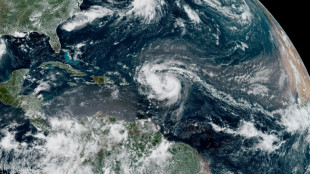
-
 Ukrainians see 'nothing' good from Trump-Putin meeting
Ukrainians see 'nothing' good from Trump-Putin meeting
-
Pakistan rescuers recover bodies after monsoon rains kill 320
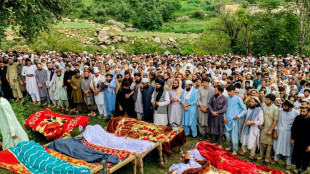
-
 Bob Simpson: Australian cricket captain and influential coach
Bob Simpson: Australian cricket captain and influential coach
-
Air Canada flight attendants strike over pay, shutting down service

-
 Air Canada set to shut down over flight attendants strike
Air Canada set to shut down over flight attendants strike
-
Sabalenka and Gauff crash out in Cincinnati as Alcaraz survives to reach semis

-
 Majority of Americans think alcohol bad for health: poll
Majority of Americans think alcohol bad for health: poll
-
Hurricane Erin intensifies in Atlantic, eyes Caribbean
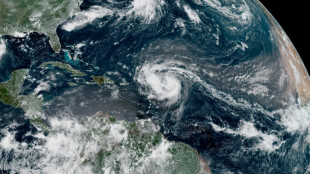
-
 Louisiana sues Roblox game platform over child safety
Louisiana sues Roblox game platform over child safety
-
Trump and Putin end summit without Ukraine deal

-
 Kildunne confident Women's Rugby World Cup 'heartbreak' can inspire England to glory
Kildunne confident Women's Rugby World Cup 'heartbreak' can inspire England to glory
-
Arsenal 'digging for gold' as title bid starts at new-look Man Utd

-
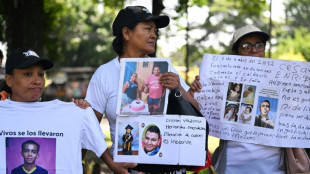 El Salvador to jail gang suspects without trial until 2027
El Salvador to jail gang suspects without trial until 2027
-
Alcaraz survives to reach Cincy semis as Rybakina topples No. 1 Sabalenka

-
 Trump, Putin cite progress but no Ukraine deal at summit
Trump, Putin cite progress but no Ukraine deal at summit
-
Trump hails Putin summit but no specifics on Ukraine

-
 Trump, Putin wrap up high-stakes Ukraine talks
Trump, Putin wrap up high-stakes Ukraine talks
-
El Salvador extends detention of suspected gang members
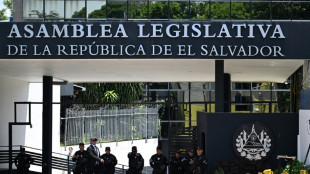
-
 Scotland's MacIntyre fires 64 to stay atop BMW Championship
Scotland's MacIntyre fires 64 to stay atop BMW Championship
-
Colombia's Munoz fires 59 to grab LIV Golf Indy lead

-
 Alcaraz survives Rublev to reach Cincy semis as Rybakina topples No. 1 Sabalenka
Alcaraz survives Rublev to reach Cincy semis as Rybakina topples No. 1 Sabalenka
-
Trump offers warm welcome to Putin at high-stakes summit

-
 Semenyo racist abuse at Liverpool shocks Bournemouth captain Smith
Semenyo racist abuse at Liverpool shocks Bournemouth captain Smith
-
After repeated explosions, new test for Musk's megarocket

-
 Liverpool strike late to beat Bournemouth as Jota remembered in Premier League opener
Liverpool strike late to beat Bournemouth as Jota remembered in Premier League opener
-
Messi expected to return for Miami against Galaxy

-
 Made-for-TV pageantry as Trump brings Putin in from cold
Made-for-TV pageantry as Trump brings Putin in from cold
-
Coman bids farewell to Bayern before move to Saudi side Al Nassr

-
 Vietnamese rice grower helps tackle Cuba's food shortage
Vietnamese rice grower helps tackle Cuba's food shortage
-
Trump, Putin shake hands at start of Alaska summit

-
 Coman bids farewell to Bayern ahead of Saudi transfer
Coman bids farewell to Bayern ahead of Saudi transfer
-
Liverpool honour Jota in emotional Premier League curtain-raiser

-
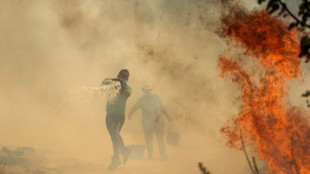 Portugal wildfires claim first victim, as Spain on wildfire alert
Portugal wildfires claim first victim, as Spain on wildfire alert
-
Davos founder Schwab cleared of misconduct by WEF probe

-
 Rybakina rips No.1 Sabalenka to book Cincinnati semi with Swiatek
Rybakina rips No.1 Sabalenka to book Cincinnati semi with Swiatek
-
Trump lands in Alaska for summit with Putin

-
 Falsehoods swirl around Trump-Putin summit
Falsehoods swirl around Trump-Putin summit
-
US retail sales rise amid limited consumer tariff hit so far

-
 Liverpool sign Parma teenager Leoni
Liverpool sign Parma teenager Leoni
-
Canadian football teams will hit the road for 2026 World Cup

-
 Bethell to become England's youngest cricket captain against Ireland
Bethell to become England's youngest cricket captain against Ireland
-
Marc Marquez seeks elusive first win in Austria

-
 Trump, Putin head for high-stakes Alaska summit
Trump, Putin head for high-stakes Alaska summit
-
Brazil court to rule from Sept 2 in Bolsonaro coup trial

-
 Deadline looms to avert Air Canada strike
Deadline looms to avert Air Canada strike
-
Spain on heat alert and 'very high to extreme' fire risk
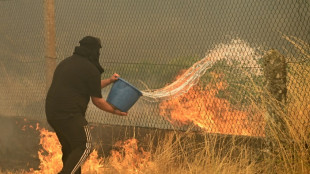
-
 Taliban mark fourth year in power in Afghanistan
Taliban mark fourth year in power in Afghanistan
-
Grand Slam Track won't happen in 2026 till athletes paid for 2025


How a Brazilian chief is staving off Amazon destruction
You don't need a GPS to find the home turf of the Amazon's most famous resident, Brazilian Chief Raoni Metuktire.
As you approach his Capoto/Jarina Indigenous territory in Mato Grosso state, large single-crop farms of soybean or maize give way to lush, verdant rainforest.
This is the epicenter of a half-century battle led by the globe-trotting activist against illegal miners and loggers hacking away at the world's biggest rainforest.
Instantly recognizable by his wooden lip plate and feathery headdress, Raoni's date of birth is unknown, but he is believed to be about 90.
Three decades ago, he toured the world with British activist-rock star Sting to press for Indigenous rights.
His home village of Metuktire, named after his clan belonging to the Kayapo people, is accessible chiefly by boat along the Xingu River, a tributary of the Amazon.
The formidable chief lived most of his life in one of the straw-and-wood huts arranged in a wide circle around a forest clearing.
He now resides mostly in the nearby city of Peixoto de Azevedo for health reasons, but will be back on his home soil Friday to receive President Luiz Inacio Lula da Silva.
Raoni told AFP in an interview ahead of the visit that he would press Lula to halt plans for an oil mega-project at the mouth of the Amazon river, and urge that the community should get custodianship of a bigger slice of forest.
"I don't allow illegal miners or timber traffickers on our land," the chief told AFP emphatically.
Raoni's 1,600-strong community has a two-pronged approach to defending its ancestral homeland: conducting patrols against intruders and teaching Indigenous youth to resist the temptation of getting rich quick at the cost of rainforest destruction.
Only 0.15 percent of Capoto/Jarina territory, which occupies an area four times the size of the mega-city of Sao Paulo, has been affected by deforestation, according to official statistics.
- 'This land is ours' -
Designating land as Indigenous territory -- where deforestation is a crime -- has proven effective in holding back the ferocious onslaught from illegal mining and agriculture.
Indigenous territories have lost less than 2.0 percent of their native plant species since 2008, compared to 30 percent on non-Indigenous lands, according to the Socio-Environmental Institute, a Brazilian NGO.
Bu to have his clan's land recognized as Indigenous territory by the state, Raoni had to resort to desperate measures.
Brazilian media have recounted how in 1984 he and his nephew hijacked a ferry, taking hostage officials from the military dictatorship then in power.
Forty days later, the state conceded.
"Garimpeiros (miners) and Whites wanted to occupy our land, but we fought until we expelled them forever," Beptok Metuktire, another leader of the community, where most use the clan name as a surname, told AFP.
"We showed them that this territory is ours," the 67-year-old added in the community's Kayapo language.
- 22,000 football fields -
Indigenous lands are nonetheless under attack, stripped every year of thousands of hectares of native vegetation.
Near the Capoto/Jarina territory, in an area inhabited by other branches of Raoni's Kayapo people, the emerald-green jungle is pockmarked by huge brown craters and pools of brackish water -- the hallmarks of illegal gold mining.
AFP saw dozens of hydraulic excavators operated by workers camped out at the site during a flight organized by environmental NGO Greenpeace.
Kayapo territory has lost the equivalent of 22,000 football fields of forest to illegal gold mining, according to Greenpeace, which notes the growing presence of organized crime groups such as Comando Vermelho, one of Brazil's biggest gangs, in the region.
"White people persuade some Indigenous leaders to mine for gold, which leads to disputes and even murders among families," said Roiti Metuktire, territorial protection coordinator at the Raoni Institute, which defends Indigenous rights.
"Changing this is difficult because people got used to the money from crime and because the land has already been degraded, they don't have anything to eat," he said.
- 'End of our world' -
While Raoni's homeland has so far managed to ward off the worst threats, one looms larger than ever: wildfires.
The Brazilian Amazon was ravaged by a staggering 140,000 fires last year -- many of them started to clear land for livestock or crops.
A blaze in Capoto/Jarina wiped out crops and medicinal plants, fellow community leader Pekan Metuktire said.
"When I was young, the climate in this village was normal. But now the sun burns, the land dries up and the rivers overflow. If this continues, it's the end of our world," he added.
The community hopes that UN conference on climate change that Lula will host in the Amazon city of Belem in November will help halt the destruction.
Ngreikueti Metuktire, a 36-year-old woman, summed up the tall task awaiting Brazil's leader, before heading to the fields to harvest cassava.
"We need Lula to speak to the world to ensure the future of our grandchildren."
A.AbuSaada--SF-PST
